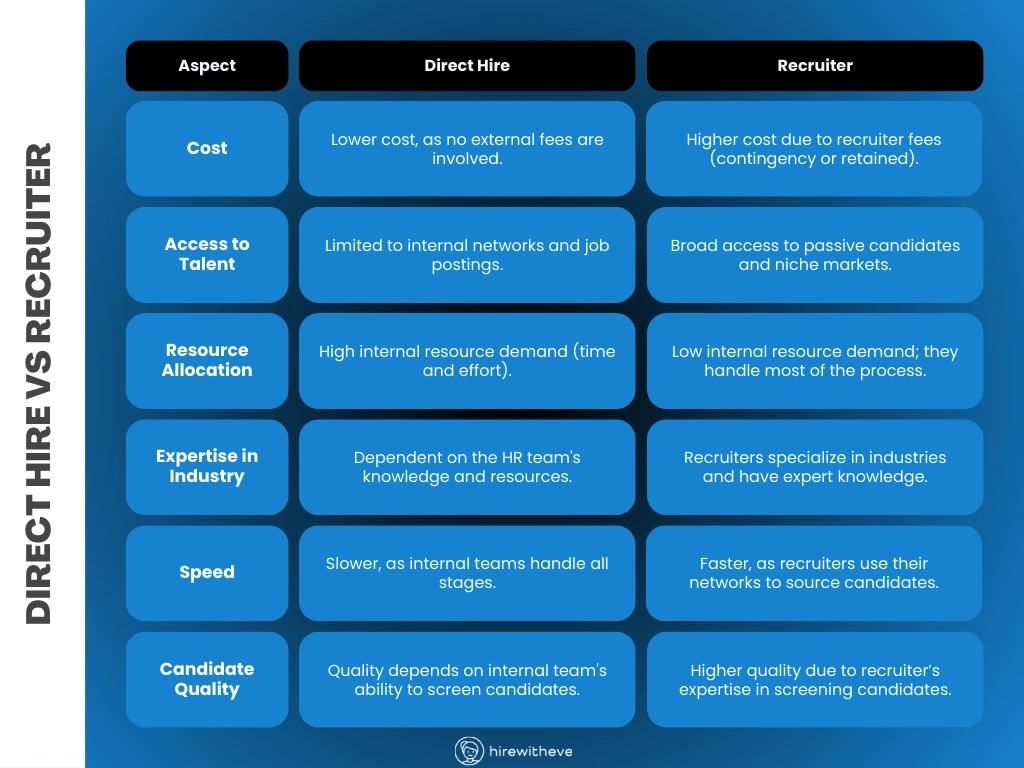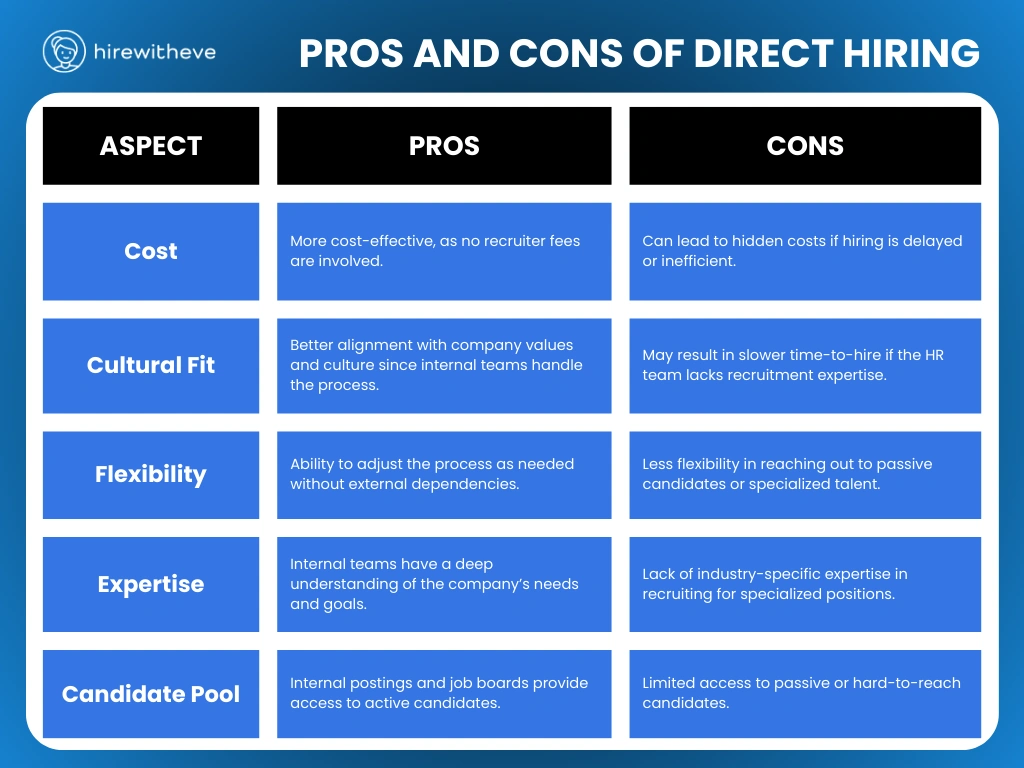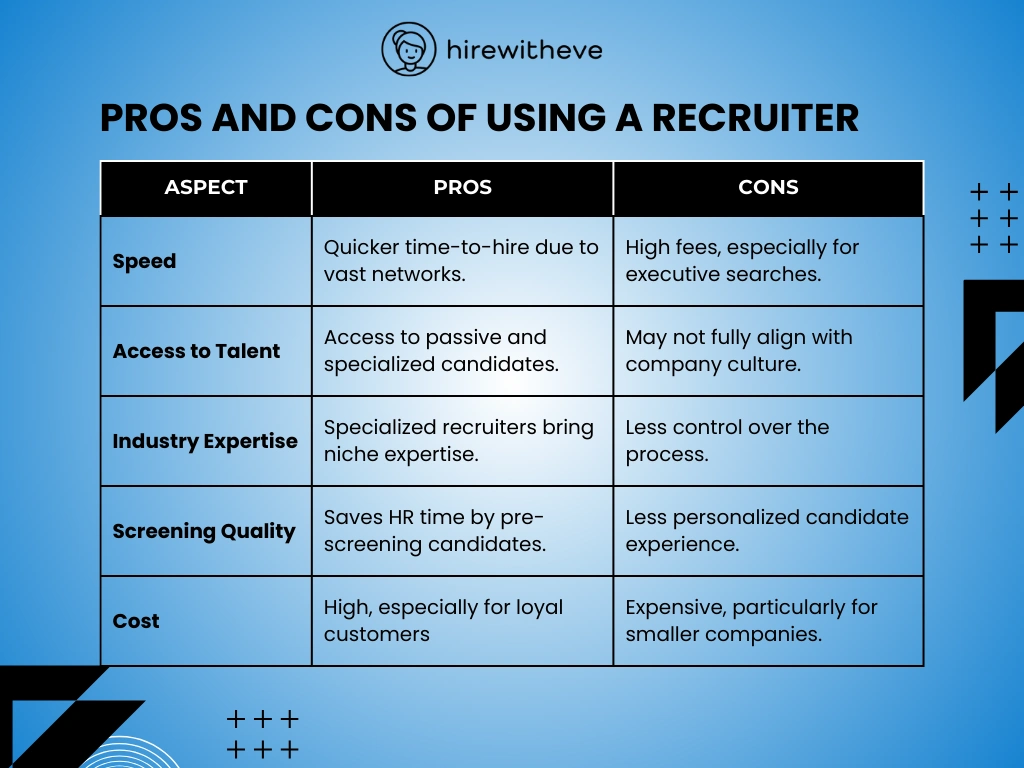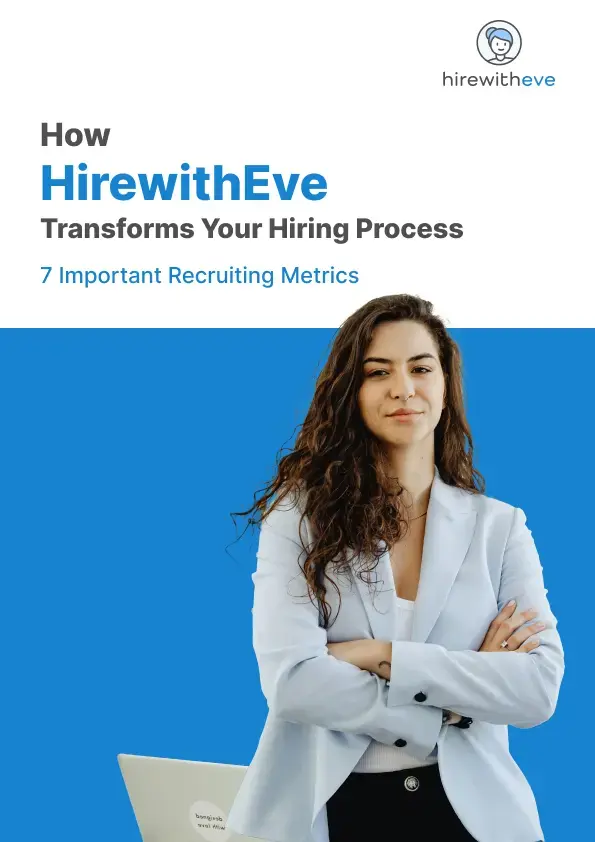Direct Hire vs Recruiter
Direct Hire vs Recruiter: Navigating the Best Choice for Your Hiring Needs

When it comes to sourcing top talent, HR managers and talent acquisition specialists are often faced with a critical decision: should they opt for a direct hire or work with a recruiter? This blog aims to explore the nuances of direct hire vs recruiter, highlighting their differences, benefits, and challenges. By the end, you'll have a clear understanding of how HirewithEve can streamline your hiring strategy, making it the best choice for either route.
The debate of direct hire vs recruiter isn't new. However, as the job market shifts toward skills-based hiring, this decision has never been more crucial. Let’s dive deeper into the fundamentals of both approaches.
Table of contents
What is Direct Hiring?
What Does a Recruiter Bring to the Table?
Direct Hire vs Recruiter: Key Differences
Pros and Cons of Direct Hiring
Pros and Cons of Using a Recruiter
When to Choose Direct Hiring?
When to Choose a Recruiter?
How HirewithEve Can Help You with Direct Hire vs Recruiter Decisions?
Maximizing Efficiency: The Future of Direct Hire vs Recruiter Debate
Conclusion
What is Direct Hiring?
Direct hiring refers to the process where a company takes full responsibility for every stage of the hiring process. In this approach, the organization’s internal HR department or hiring managers oversee every step, from drafting the job description to advertising the position, sourcing candidates, conducting interviews, and making the final selection.
Steps Involved in Direct Hiring:
Job Posting: The HR team creates and distributes job ads through various platforms, such as job boards, company websites, and social media.
Screening: Applications are reviewed, and resumes are screened to identify candidates who meet the required qualifications.
Interviews: Shortlisted candidates go through a series of interviews, which can include phone screenings, technical assessments, and in-person or video interviews.
Reference Checks: For top candidates, reference checks are conducted to verify their past employment and performance.
Final Selection: The company decides who is the best fit and extends an offer, handling salary negotiations and contract finalization internally.
Advantages of Direct Hiring:
Complete Control: The company controls every aspect of the recruitment process, allowing for a high level of customization. This is particularly useful for roles that require a strong cultural fit or highly specific technical skills.
Cultural Alignment: Since the internal team is familiar with the company’s values and culture, they are better equipped to assess candidates for both technical competency and cultural fit.
Cost Savings: Direct hiring eliminates third-party recruiter fees, which can significantly reduce costs. This is especially valuable for companies with high hiring volumes or smaller budgets.
However, direct hiring can be resource-intensive, as it requires the internal HR team to dedicate substantial time and effort to sourcing and interviewing candidates, which can be a challenge in today’s fast-paced hiring landscape.
What Does a Recruiter Bring to the Table?
Recruiters are external professionals or agencies specialized in sourcing talent for companies. They are typically hired on a contingency or retained basis, depending on the hiring company’s needs and the nature of the role to be filled.
Recruiters take on the bulk of the work when it comes to finding and screening candidates. They often have access to extensive networks and databases that allow them to identify qualified candidates quickly. This makes them particularly valuable in industries where there is a shortage of skilled workers or where positions need to be filled urgently.
Types of Recruiters:
Contingency Recruiters: These recruiters are paid only when they successfully place a candidate in the role. They often work with multiple companies at once and typically handle lower to mid-level positions.
Retained Recruiters: Retained recruiters are hired on an exclusive basis for high-level or executive roles. They work closely with the hiring company to understand its needs and typically receive a fee upfront, with the remaining balance paid upon placement.
Key Roles of a Recruiter:
Sourcing Talent: Recruiters leverage their extensive networks and databases to find candidates who may not be actively looking for new roles. This passive talent pool is often difficult for companies to access directly.
Pre-screening: Recruiters handle the initial rounds of screening, including resume reviews, background checks, and preliminary interviews, ensuring only qualified candidates reach the company for further interviews.
Speed and Efficiency: Recruiters, especially those specializing in certain industries, can often present qualified candidates much faster than internal HR teams. This is crucial in sectors with high competition for talent.
Advantages of Working with a Recruiter:
Access to a Broader Talent Pool: Recruiters have connections with candidates who may not be actively job hunting but are open to the right opportunity. This gives them access to a more extensive range of candidates.
Specialized Expertise: Many recruiters specialize in specific industries or roles, meaning they have a deeper understanding of what is required for particular positions. This expertise allows them to find candidates more efficiently than internal teams.
Reduced Time to Hire: Recruiters streamline the hiring process by quickly identifying and pre-screening candidates, enabling companies to fill positions faster.
Direct Hire vs Recruiter: Key Differences
To better understand the differences between direct hire vs recruiter, consider how each method impacts your control over the hiring process, speed of recruitment, and the ability to find the best talent. The image below captures the contrasting approaches, helping to visualize the key distinctions in decision-making.

As the image illustrates, each approach has its strengths and weaknesses, making it important for HR managers to weigh the benefits of control versus speed. Whether direct hiring gives you the insight you need or a recruiter offers faster results, the right choice depends on your specific needs.
Pros and Cons of Direct Hiring
When evaluating direct hire vs recruiter, it’s essential to weigh the pros and cons of each approach. Below, the image offers a visual summary of the advantages and challenges of direct hiring, helping you make an informed decision.

The image helps clarify the key benefits and limitations of direct hiring. While the control over the process is valuable, the time and effort involved can be a significant drawback. Keeping these factors in mind will guide your approach to direct hire vs recruiter decisions.
Pros and Cons of Using a Recruiter
The role of recruiters in the direct hire vs recruiter debate brings its own set of pros and cons. The image below showcases the major benefits recruiters offer and the potential downsides, helping you see the trade-offs involved.

From faster hiring timelines to access to a larger talent pool, the image highlights that recruiters are often a preferred choice for specialized roles. However, the associated costs and reduced control must also be factored into the equation when deciding between direct hire vs recruiter.
When to Choose Direct Hiring?
Direct hiring can be a strong option under specific circumstances. It works particularly well for organizations that have a well-established HR team capable of handling all aspects of the recruitment process. Here are scenarios where direct hiring is likely to be the best choice:
Ideal Scenarios for Direct Hiring:
Large Talent Pools: For roles where the pool of qualified candidates is large and easily accessible, direct hiring is often the preferred option. These may include roles that don’t require specialized technical skills or executive-level experience.
Cultural Fit is Critical: If your organization places a high premium on culture and employee engagement, direct hiring allows your internal team to deeply assess how well a candidate aligns with the company’s values. Internal teams can often evaluate a candidate’s fit with the organization’s mission, vision, and day-to-day work culture more thoroughly than an external recruiter.
Lower Hiring Frequency: Companies that do not need to hire often may find it more cost-effective to handle recruitment internally, as the expense of using external recruiters may not justify the cost for infrequent hiring needs.
Time Flexibility: Direct hiring is well-suited to situations where there is no urgent pressure to fill a role. If time is not a constraint, internal teams can take the necessary time to ensure that the right hire is made, considering all aspects such as skills, experience, and long-term potential.
When Direct Hiring Might Not Be Ideal:
While direct hiring offers many advantages, it can become a challenge when the role demands specific skills that are difficult to find or when the need to hire is time-sensitive. For companies without a dedicated HR team, handling the entire process in-house can also be overwhelming, making external recruitment a more attractive option.
When to Choose a Recruiter?
Choosing a recruiter becomes the better option in scenarios where finding the right talent is time-sensitive, and specialized, or when the internal HR team does not have the resources to conduct an exhaustive search. Here are situations where working with a recruiter is ideal:
Ideal Scenarios for Using a Recruiter:
Time-Sensitive Hiring: When speed is essential, working with a recruiter can significantly reduce the time-to-hire. Recruiters have established networks and databases, allowing them to present candidates faster than an internal team that may need to advertise and manually source candidates.
Niche or Hard-to-Fill Roles: For specialized positions requiring rare skill sets, external recruiters are often more successful at locating candidates. They have access to passive candidates who may not be actively applying for jobs but could be interested in the right opportunity.
High-Level or Executive Searches: Recruiters are especially valuable for C-suite or executive roles where the stakes are high. A retained recruiter often works closely with the hiring company to ensure the candidate fits the company’s leadership needs and long-term goals.
Lack of Internal Resources: Smaller companies or those without a robust HR department may lack the internal resources or expertise to carry out a thorough hiring process. Recruiters provide the necessary manpower and knowledge to manage the entire recruitment lifecycle, from sourcing to offer negotiation.
Challenges with Using Recruiters:
While recruiters can offer significant benefits, there are also considerations that HR managers must weigh before deciding to use one. Recruiters charge fees that can be substantial, particularly for high-level roles. In addition, handing off control to an external recruiter means the company may have less say in how candidates are presented or screened, making it important to choose a recruiter who understands your specific needs and company culture.
How HirewithEve Can Help You with Direct Hire vs Recruiter Decisions?
When making the direct hire vs recruiter decision, HirewithEve is the ideal platform to help streamline the process, regardless of your chosen approach. Here’s how:
Skills-Based Assessments: HirewithEve's skills-based assessments allow you to focus on the specific competencies needed for the role, whether handling the hire directly or using a recruiter. This ensures that only the most qualified candidates progress through your pipeline.
ATS (Applicant Tracking System) Integration: HirewithEve might offer integration with ATS platforms to improve the efficiency of the hiring process, making it easier for HR teams to track and manage candidates.
Remote Hiring Support: Given the shift towards remote work, the platform likely includes features that help companies find and hire the best talent from anywhere worldwide, breaking down geographical barriers.
Analytics and Insights: The platform offers analytics features to provide insights into hiring trends, candidate performance, and the effectiveness of various hiring strategies.
Maximizing Efficiency: The Future of Direct Hire vs Recruiter Debate
The future of recruitment is leaning toward a hybrid approach where companies utilize both direct hiring and recruiters, depending on the role and urgency. Direct hire vs recruiter may no longer be a binary decision but one of strategy and optimization.
HirewithEve is at the forefront of this shift, offering features that align with both approaches. For companies that want more control, direct hiring with skills-based assessments provides a deep dive into talent evaluation. On the other hand, working with recruiters who use the HirewithEve platform ensures the same level of rigor when it comes to assessing skills.
Conclusion
The choice between direct hire vs recruiter ultimately comes down to your company’s specific needs. Whether you're focusing on control, speed, or cost, both approaches have their merits. With HirewithEve, you don’t have to choose one over the other — its flexible features support both direct hiring and recruiter-based strategies, ensuring you always find the right candidate, with the right skills, at the right time.
Target Your Talent
Unlock tailored solutions for your recruitment and hiring needs with Eve Platform's extensive case study library.
Subscribe now to enhance your HR expertise and excel in your role.
Free Resources

Transforming Hiring: 7 Key Recruiting Metrics
Enhancing recruitment processes with data-driven insights for better hiring outcomes.

Reducing Hiring Bias with Hirewitheve.
Utilizing Hirewitheve to combat bias and streamline recruitment processes effectively.

Hiring Detail-Oriented Candidates
HirewithEve enhances hiring by accurately assessing candidate's attention to detail-oriented.
